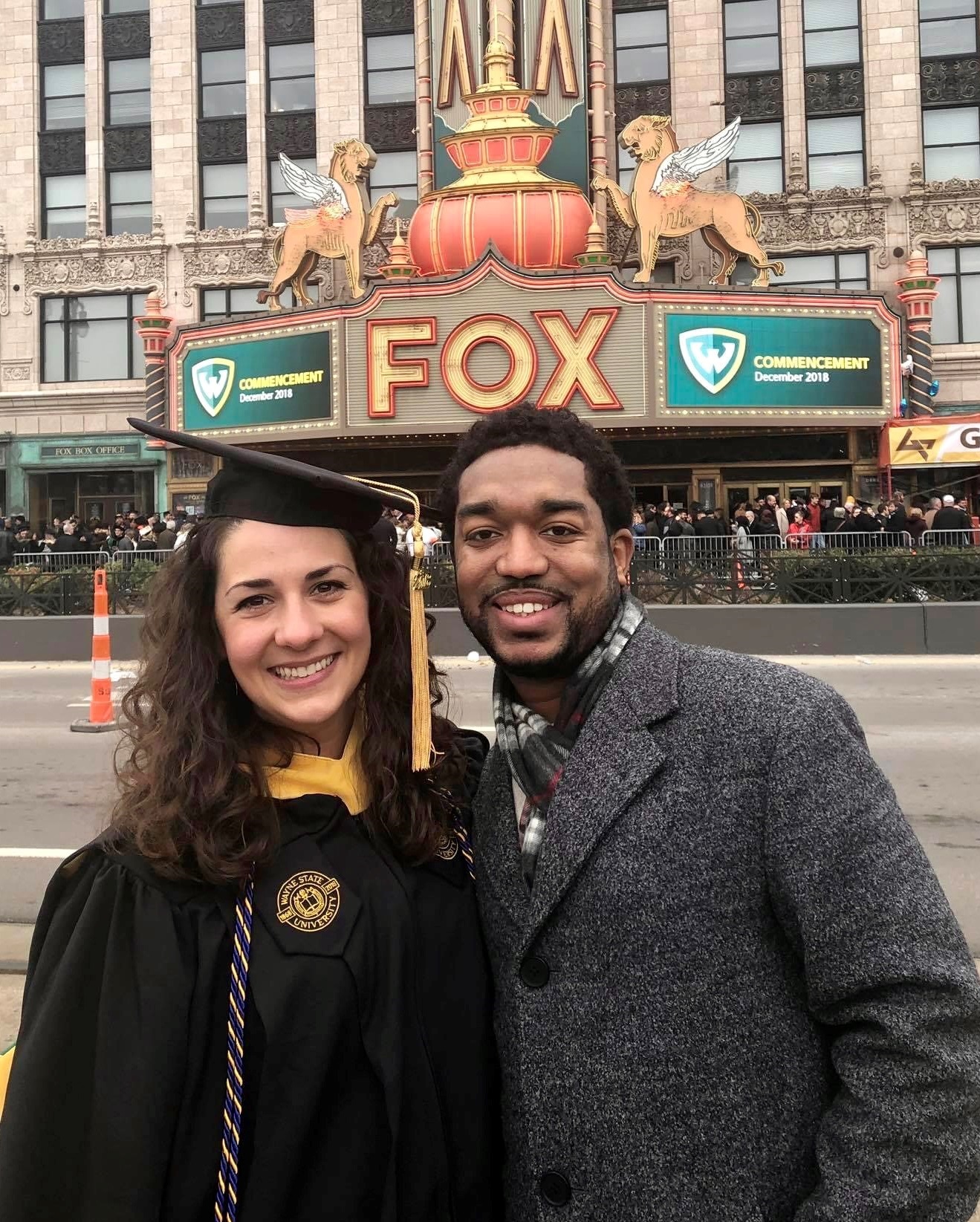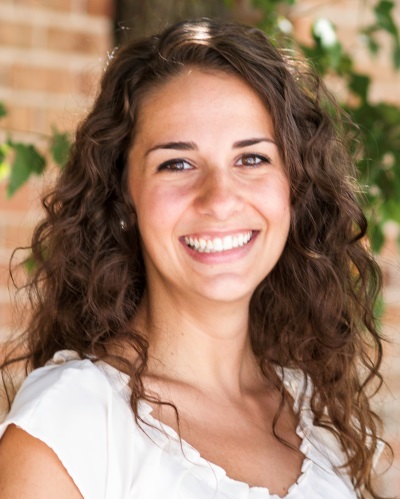Social work licensure practice exam helps alum put classroom knowledge into macro system community action
For Nicole Hamameh the journey to obtain her MSW and social work license did not begin until several years after working in the community providing services to those impacted by the criminal/legal system, homelessness, or who had mental health or substance use disorders. After obtaining her MSW from Wayne State in 2018, Hamameh started taking steps toward earning her social work licensure.
Hamameh earned an undergraduate degree in psychology and sociology from the University of Michigan - Dearborn where she participated in the Inside Out Prison Exchange program, which sparked her interest working with those affected by the criminal/legal system. “Learning side-by-side with men who were incarcerated at the former Ryan Correctional Facility provided an educational experience like no other. It was the first time I learned about systems of privilege, power, and oppression, especially as they relate to the criminal/legal system, and I spent a lot of time unpacking my own role in perpetuating those systems. I met some of the most brilliant, kind-hearted people inside that facility and I knew after taking that course that my career would be dedicated to preventing people from becoming involved with our legal system... and if I couldn’t do that, I would at least work to make sure that time spent in unavoidable incarceration doesn’t cause further harm, and that people who had been incarcerated would have equitable opportunities to live healthy, happy, productive, and fulfilling lives post-release.”

Hamameh went on to work full-time at a non-profit in Detroit and needed a program that offered a conveniently located part-time graduate program with an urban social justice focus and evening classes. “The Wayne State School of Social Work checked all the boxes for me. Most importantly, I knew their focus on social justice would align well with my personal priorities and the work I was already doing in the city.” Hamameh graduated with a master of social work focused on interpersonal practice and a graduate certificate in alcohol and drug abuse studies (CADAS) in 2018.
“After graduating, the School’s social media presence helped me stay connected to current events and new happenings. It was just a few months after earning my MSW that I first learned the School was opening the new Center for Behavioral Health and Justice (CBHJ). I was eager to learn more about the Center and was excited by the idea of working at a place where both behavioral health and criminal/legal systems were the focus.” In 2019, Hamameh joined the CBHJ as a program coordinator for the Opioid Treatment Ecosystem, an initiative to expand access to treatment for opioid use disorder for people impacted by the criminal/legal system. Hamameh facilitates ongoing collaboration among behavioral health and medical providers, corrections staff, first responders, and other community stakeholders.
The criminal/legal system impacts and is impacted by so many other systems – I think it’s one of the most important places for social workers to be! Social workers have the knowledge and skills to make an impact by reducing the number of people who come in contact with the criminal/legal system, improving systems and support available to those who do, implementing more just and effective alternatives to incarceration, and advocating for policies that promote public safety without causing further harm to individuals and communities.
 A few years after obtaining her MSW and a few thousand hours of supervised practice experience later, Hamameh scheduled her appointment to sit for the social work licensure exam and decided it was time to crack the books. “My social work education primarily focused on writing papers to demonstrate knowledge, not taking tests, so the thought of taking this massive exam was pretty intimidating.” Hamameh started by reviewing content in a licensure exam prep book every morning before work for about a month and focused on theoretical concepts, keywords, and common social work approaches, but still wasn’t feeling totally confident about the structure of the exam questions. “Luckily, I learned of the licensure practice test offered by the School just a few weeks prior to my exam.” Offered in a convenient online format, the 90-day practice test subscription includes 2 four-hour timed clinical exams and access to a mini-clinical exam test – both of which can be taken up to three times. “I didn’t do so great on the first practice test, but after reviewing the answers and rationale for the questions I got wrong, I did much better on subsequent tests.” Hamameh focused on taking practice tests for the last chunk of time leading up to the exam and “…to my surprise, I aced the exam with flying colors and I’m certain it was because the licensure practice tests helped me master how to answer the questions. The content is important to know, but strategy is key!”
A few years after obtaining her MSW and a few thousand hours of supervised practice experience later, Hamameh scheduled her appointment to sit for the social work licensure exam and decided it was time to crack the books. “My social work education primarily focused on writing papers to demonstrate knowledge, not taking tests, so the thought of taking this massive exam was pretty intimidating.” Hamameh started by reviewing content in a licensure exam prep book every morning before work for about a month and focused on theoretical concepts, keywords, and common social work approaches, but still wasn’t feeling totally confident about the structure of the exam questions. “Luckily, I learned of the licensure practice test offered by the School just a few weeks prior to my exam.” Offered in a convenient online format, the 90-day practice test subscription includes 2 four-hour timed clinical exams and access to a mini-clinical exam test – both of which can be taken up to three times. “I didn’t do so great on the first practice test, but after reviewing the answers and rationale for the questions I got wrong, I did much better on subsequent tests.” Hamameh focused on taking practice tests for the last chunk of time leading up to the exam and “…to my surprise, I aced the exam with flying colors and I’m certain it was because the licensure practice tests helped me master how to answer the questions. The content is important to know, but strategy is key!”
When prepping for the exam I think it’s important to find a process that works for you and not be afraid to refine it as needed. I realized studying at the end of a long workday was useless for me because I was already so drained, but switching to 5 am study sessions really helped me stay focused. Don’t hesitate to ask for help managing your other responsibilities at home and work so you can adjust your focus to exam prep – remember, it’s just temporary!
“Many people offered words of support to me as I prepared for the exam, but there were two bits of encouragement that stood out and truly carried me through the exam: 1) you won’t know your score until you have a score, so stop trying to predict how you’ll do, and 2) your score on the exam has no relation to how awesome you are at what you do in real life.”
As a licensed clinical social worker, Hamameh plans to put her classroom knowledge and community skills to good use in her macro social work and organizational client relationships. “I’d love to do more to elevate the voices and perspectives of people impacted by the systems the CBHJ works to improve and look forward to a project coming down the pipeline where we’ll do just that. I’ve been fortunate to have some tremendous social work mentors and supervisors over the years and hope to also provide supervision and guidance to new social workers one day. In my omnipresent quest to ‘do more’, I am also considering getting back to my roots to do some part-time clinical work on the side too.”
Learn more about the licensure practice exam offered by the Wayne State University Social Work Continuing Education Office.
View additional alumni and donor spotlights.